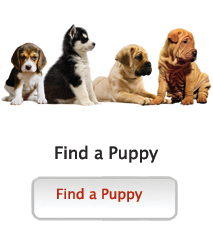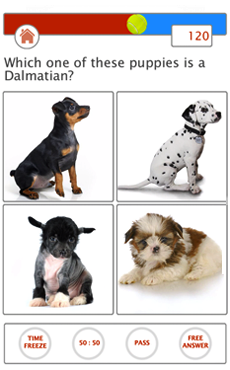Dogs for your circumstances
|
Families Families need a dog which is child friendly, patient, calm, playful, tolerant, active and affectionate. A good breed group to consider would be the gundog as they are energetic enough for active families but are also easy to train and very loving. You might consider the New Foundland due to its patience and affinity for children or the Golden Retriever for its intelligence, trainability and friendly nature.
Apartment dwellers If you live in a flat then you’ll need a small, quiet with a low exercise requirement. Consider the toy group. The pug is well suited to urban life due to a minimal need for grooming and exercise, as well as its size.
Allergy sufferers People who suffer from allergies should look for low dander and low or non-shedding breeds. The Giant Schnauzer is a great dog for allergy sufferers who would like a large dog. The Chinese Crested Hairless only has a small amount of hair on its head, tail and feet, making it very suitable for people with severe allergies.
First time owners Inexperienced dog owners need to choose a breed which is easy to train, affectionate, eager to please and submissive. The Labrador Retriever is friendly, loving and eager to learn, making it good breed choice for first time owners. The Springer Spaniel is easy to train, responsive and submissive, so shouldn’t be too hard for new dog owners to handle
Experienced owners Experienced owners might want a breed which is a challenge to train and may be more suited to larger dogs, high activity levels and highly protective dogs than other people. Utility and working dogs would create enough of a challenge for an experienced owner. The Shiba Inu is stubborn and independent, and can be quite cat-like, so will do best with experienced owner who can make training fun and interesting
Active people If you are sporty, athletic and active then you’ll want a dog that can keep up with you. Look for high energy, medium to large sized dogs that enjoy running, walking and swimming. Dogs from the working, utility and hound groups will be best suited to your lifestyle. Consider Siberian Huskies; they were bred to pull sleds for hours, making them great for long distance runners. If you prefer to cycle, then a Rhodesian Ridgeback is capable of keeping a steady pace for long periods of time.
Less active people If you’d rather spend the afternoon on the sofa than on a run, then you’ll want a lap dog with low exercise needs that is affectionate and cuddly and prefers to be indoors than on a walk. The toy groups is perfect for you. Why not look into the Bolognese? They are playful without being too active, though they will still appreciate short walks.
Once you’ve considered how a dog will fit in with your lifestyle, think about what you need to be able to offer a dog. Consider the following points:
Size – A dog’s size will determine how much money is spent on food, how much exercise it needs and how much space it requires. A Pomeranian will be perfectly fine living in an apartment, but a Labrador will need the space of a house.
Energy – Can you provide enough exercise and activity for a lively, spirited dog with a lot of energy or would you prefer a cuddly, lap dog that needs only a little exercise? Inactive people will struggle to keep up with the demands of a dog like the Rhodesian Ridgeback while very sporty athletic owners may become frustrated with the lack of activity a pug shows.
Noise – Do you live in a flat or have close neighbours and therefore need a quiet breed like a Cesky Terrier? Will grunting, snoring and snorting from flat faced dogs like pugs frustrate you?
Activities – Will you be able to provide the activities which certain breeds love? For example, golden retrievers love to swim, retrieve, hunt and run; if you live in an urban environment it’s unlikely that you’ll be able to provide these things for your retriever.
Sociability – Will you be upset if your dog doesn’t like strangers or won’t interact with other people or animals well? Or would you prefer a dog which is aloof? If you want a dog which will welcome people into your home cheerfully then consider a breed like the Labrador, which is inherently sociable and charming.
Training – Certain breeds can be particularly stubborn or may be easily distracted, making them difficult to train. Will you see this as a fun challenge or an annoyance? Dogs which are hard to train, such as the Shiba Inu generally aren’t suitable for first time owners. Do you think of training as a fun activity or a chore? You may want to choose an easier breed to train if you don’t have much enthusiasm for training.
Affection – Some breeds can come across as very reserved and don’t seem to need their owner’s affections as much as others. If you are looking for a cuddly, loving and affectionate dog then you don’t want to end up with an independent dog that is perfectly happy in his own company. Likewise, you may prefer a dog that is more independent and therefore a constant companion who hates to be without you, such as a Chihuahua, would be a poor fit.
When you have a good idea of the kind of dog you would be best suited to and can provide for, you are ready to start your breed research. Well thought out research will cover not just individual breeds but also breed groups. Take into account every detail of the breeds, including personality, temperament, characteristics and traits as well as life expectancy, care, health and grooming. Why not try our Compatibility Test to help you find some suitable breeds?
Once you have a few breeds in mind, consider contacting breed clubs or asking existing owners for their point of view , as experienced owners will be able to give you a greater amount of information and answer any questions about the breed which you may have. You could also consider visiting dog shows and events such as Discover Dogs and Pup Aid.
Try not to get swept up in the excitement of buying a dog and rush into anything. Take your time and don’t make hasty decisions. Choosing which breed to get is an important decision to make and should be thoroughly considered and discussed with the rest of the household. Think you’ve found the perfect breed? Go back and do a bit more research to make sure you’re 100% certain. You may find one detail which changes everything, or you may put any niggling worries to bed. Before you make your final decision you should know the breed’s needs and character inside and out.
|
- There are no comments yet









